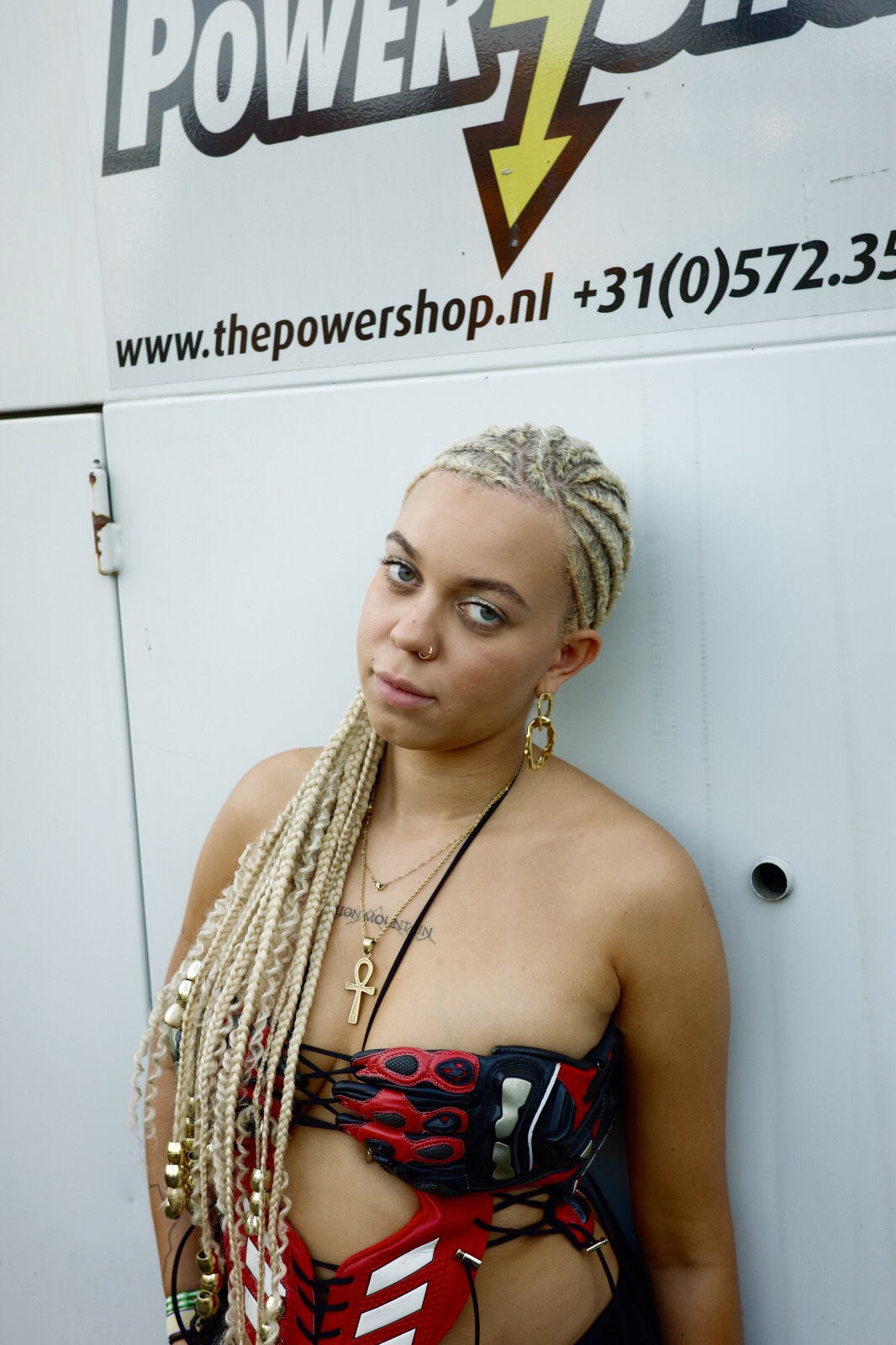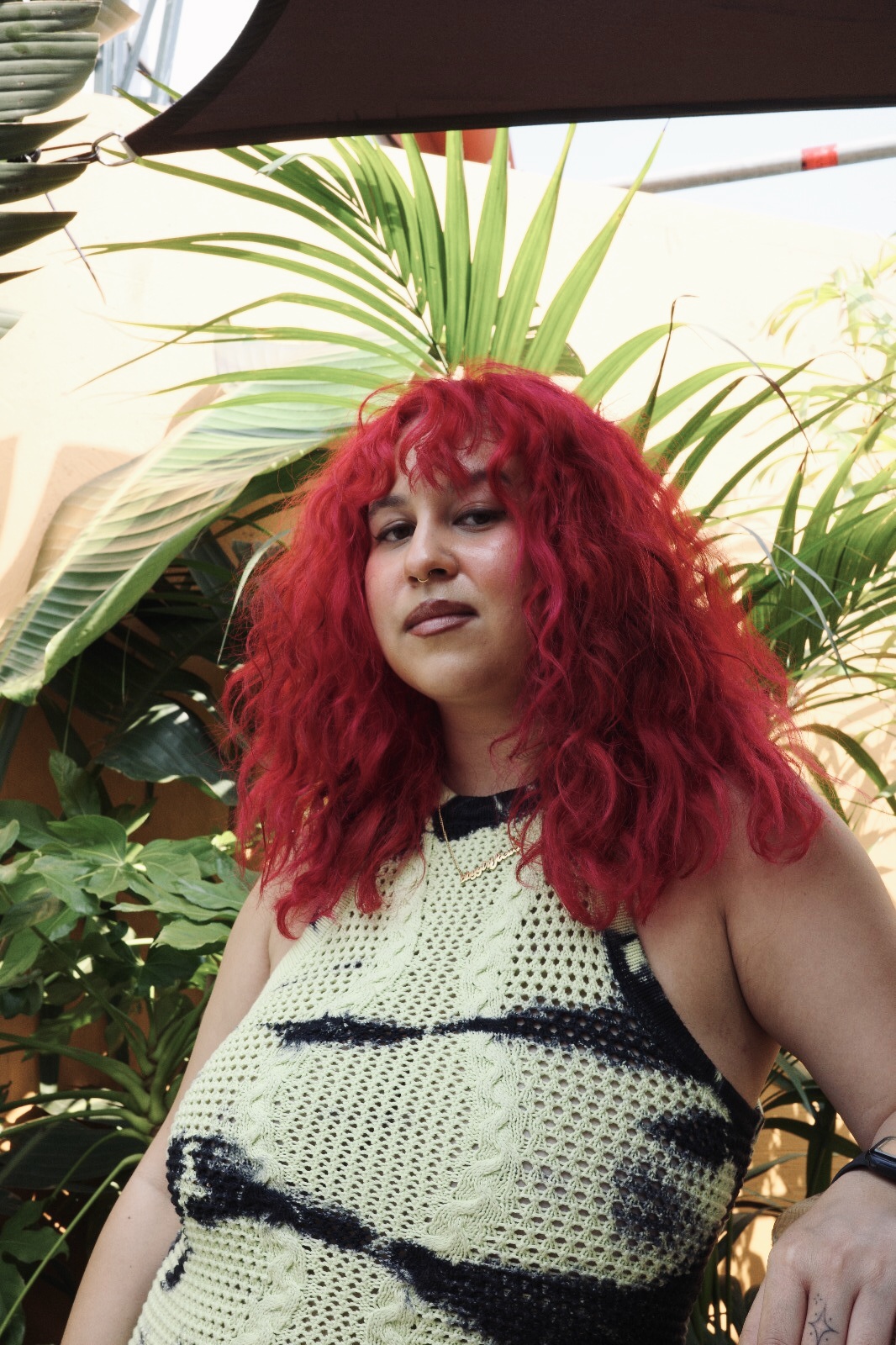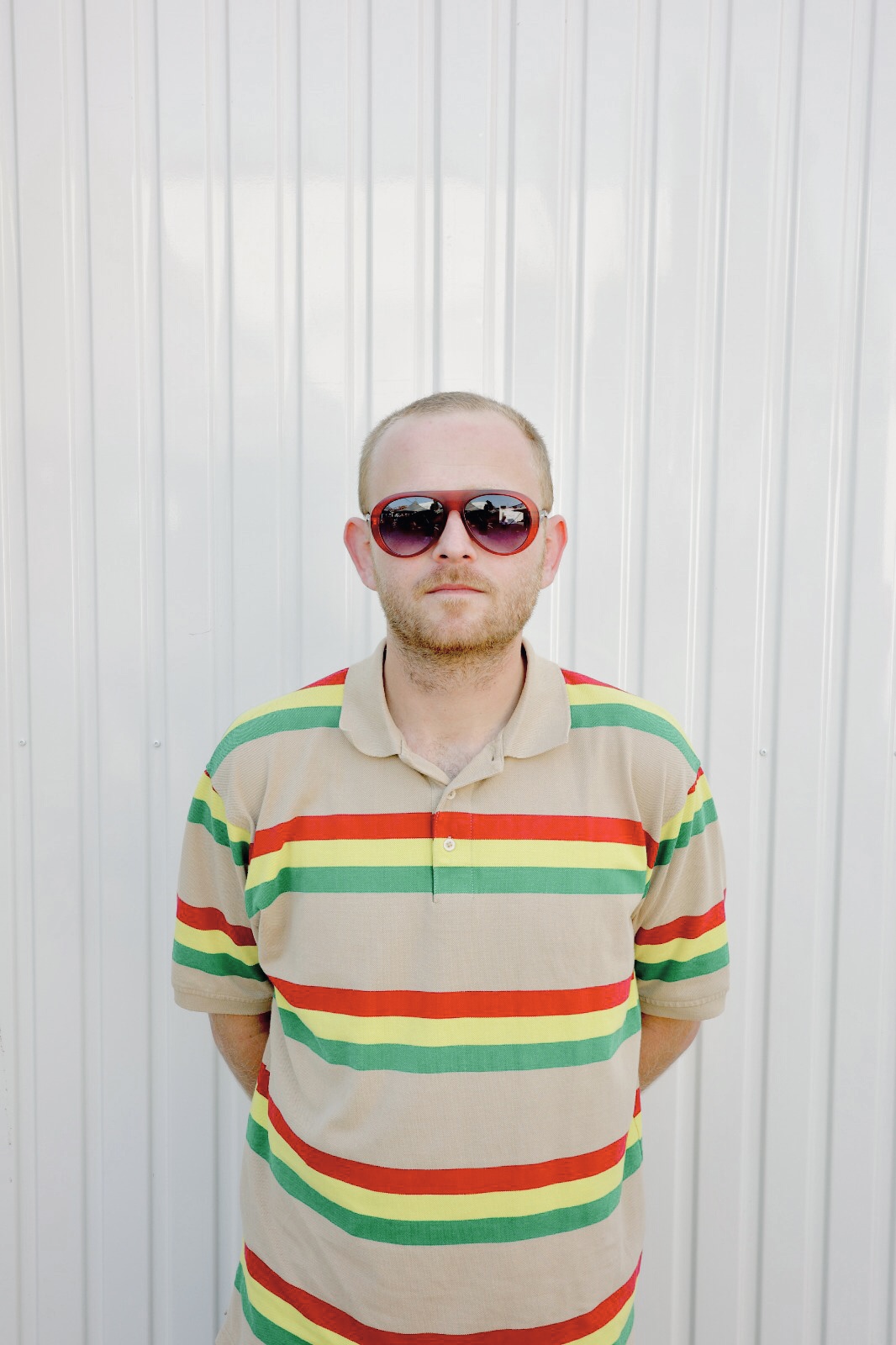In conversation with TIDA KAMARA, JADE SOUL and ROZALY

Photo: Rogier Vlaming
Being a staple name on the Amsterdam nightlife scene in the last few years, it was only a matter of time until we caught up with Tida Kamara. Bringing a sizzling blend of genres like UK garage, baile funk, and musical influences from her Sierra-Leonean heritage, Kamara’s sets are fluid ventures into rhythm and culture.
You’ve been a rising Star Since 2022. Can you tell us a little about your musical journey?
My musical journey started out of boredom, actually. I was studying something I wasn’t passionate about, and I thought I needed a hobby that suited me. I’ve always been really into music, and my sister suggested I start DJing. She thought it would suit me well because of my personality and my love for music.
Did you already have a strong interest in music?
Yeah, it started in high school. Everyone had something they were good at, and I didn’t really have that. But I was always great at making playlists and sharing them with everyone at school.
Makes sense that your sister picked up on that!
Yeah, and it also ties into my cultural background. I’m half Sierra-Leonian, which has a big influence on my music choices. So, it started from boredom but was driven by a deep love for music.
How would you describe your musical style?
It’s very eclectic. I play everything from 70 BPM to 170 BPM. It can range from the hardest bubbling Latin tech to the softest R&B lounge music. It’s all about the vibe. I can’t describe it in one sentence; it depends on my mood and the crowd’s energy. If the crowd is relaxed, I’ll go with a lower BPM. If the energy is high, I’ll take it up. It’s very fluid.
You also started your own party, Rooted. Can you share the philosophy behind it?
Rooted is about culture, music, and identity. It’s a space for people, especially DJs of colour, to showcase their stories without limits on what they can play. It’s rooted in dance culture, youth culture, and the personal histories of the DJs I book.
What was the motivation behind starting Rooted?
In Amsterdam, the music scene can be very segmented. I wanted to create a party that breaks free from that, where you can hear techno DJs and Afrobeat DJs at the same event. It’s about the experience, the vibe, and educating people on different sounds. This creates a very diverse crowd, which I love.
Do you feel the scene in Amsterdam limits you in any way?
I don’t feel restricted because I’ve broken free from those limitations. Now I get booked for my own sound. When you’re starting out, you might be put in a box, but I’ve moved past that and have the freedom to do whatever I want.
You’re playing Lowlands tonight. How do you feel about it?
I’m super excited! It’s the last slot of the night, so I have complete freedom. Closing Lowlands is an honor, and I didn’t expect to get this spot so soon. I’ve prepared this set from start to motherfucking finish, which I usually don’t do as I’m typically more fluid. But for this, I know exactly what’s going to happen every second of my set, and it feels good to be so prepared.
What can we expect from your set?
You can expect a lot! There’ll be baile funk, automotivo, bubbling, UK garage, and bubu music — Sierra-Leonean sounds that are high BPM. And definitely some ass-shaking moments, because that’s important to me!
Are there any other DJs you’re excited to see?
So many! It feels like one big family here. I’m excited to see my friends Gyatso, Jolani Jhones — everyone. I’m sad I missed Interplanetary Criminal yesterday, and I was really excited to see Ramon Sucesso from Brazil, but he canceled. Still, I’m here to support all my friends.
It’s a family affair.
Absolutely!

Photo: Jessica van Halteren
Meet Jade Soul, the Rotterdam DJ who’s redefining the dancefloor with her genre-bending approach and infectious energy. Her name reflects Jade’s values perfectly, as she exclusively plays music that has a soul, irrespective of the genre. Her unique ability to mix and match sounds into a storytelling-driven straight-from-the-heart experience has quickly made her a standout in the DJ scene. We caught up with Ms Soul to dive into her musical influences, her approach to curating tracks, and how she brings a fresh, soulful foundation to every performance.
How did your love for music begin, and how did you get into DJing?
It’s been an interesting road. I’ve been involved in events for about eight years now. I’m from Rotterdam, and I started by throwing and helping with events. After about four years, I’d seen a lot of DJs and realised that I could bring something to the music scene too. I always knew I needed to do something with music, but I wasn’t sure what. Then during the pandemic, I started practicing DJing again. My first booking came in Amsterdam, even though I’m from Rotterdam. My very first gig was at Mono Rotterdam during COVID, so people were seated. But my first real club gig was at Bitterzoet in Amsterdam for Passionfruit, and that’s where things really took off. After that, I became a resident DJ there, which helped me grow a lot. I learned how to connect with the crowd because playing for people is so different from practicing at home. It felt really special, though I was super nervous. Starting something new can be vulnerable, but I knew it was what I was meant to do.
How did you handle the nerves when you first started performing?
Most of the time, I get positive nerves, which motivate me. It’s important to remember that DJing is also a job, and I take it seriously. When I’m performing, I’m in a bubble—I hear the crowd, but I’m deeply focused. That focus helps me manage the nerves and deliver a good set.
Your journey started during COVID, and now you’re playing at Lowlands. How does that feel?
It feels like a sign from the universe that this is my path. I’ve had some amazing bookings, including international gigs and now I’m literally performing at Lowlands. Recently, I played at one of the biggest Hip-Hop festivals for 5,000 people. It’s been an incredible ride.
You mix genres like soul, house, and disco. How do you curate your music?
It’s a job next to a job—every week I’m digging for music. It’s not just about preparing for gigs but also about finding new tracks. As a DJ, it’s my responsibility to introduce people to music they don’t normally hear in clubs. I spend a lot of time on streaming services like Deezer and Spotify, but I’m a huge fan of SoundCloud and Bandcamp. These platforms help me discover both underground and established artists. Bandcamp is great because it directly supports the artists for what they do.
What do you look for in the tracks you collect?
I look for anything that has a soul – that’s why I’m called Jade Soul. It doesn’t mean that it has to be exclusively soul music. I also play UKG, trap, Jersey club, but if you listen closely you will hear something soulful in the beat, in the lyrics or a bassline. I don’t want to stick to one genre – I want to play multi-faceted music but always with a storyline.
The soul is the key!
ALWAYS.
Best track of the summer?
Tough question! There is one I’m going to play today, it’s called I Know from p-rallel. The vibe is very summery. I’m also a big Batida fan. It’s very ghetto style originating from Lisbon, which I will also play a lot of.
What was the biggest challenge within your musical career?
A combination of feeling like this is my path, believing in myself and what I do, and seeing the reaction of other people. All of that made me assured that it is what I’m meant to do. But for a long time, I was never surrounded by the environment that inspired me to do anything with music. My biggest inspiration is my dad, who is a guitarist, so music was actually a more natural path for me than I initially felt. The biggest challenge is believing in what you bring to the table, which I’m very confident in now.

Photo: Rogier Vlaming
Introducing Rozaly, the trailblazing sonic researcher and DJ hailing from Curaçao who is rapidly making his mark in the world of music and art. With work that blends absurdism and deep cultural research, Rozaly is challenging Western dance music norms while uncovering lost Caribbean heritage, further connecting to his identity. In this interview, Rozaly shares his future plans, the reason behind his DJ name, and the making of what became an enlightening musical experience.
First of all, why the name Rozaly? What’s behind it?
Honestly, there’s no deep meaning behind it. I used to have a name that was more personally connected to me, but I felt it limited my musical freedom. One day, while I was on my computer, the name Rozaly just came to me, with a Z and a Y. It resonated with me because it’s not tied to a specific gender. I mean, I look like a typical white, blonde, Caucasian male but with this name, there are no expectations. It gives me a lot of creative space.
Besides being a resident at Garage Noord, you’ve also played at festivals like Dekmantel, Selectors, Down the Rabbit Hole, and Lowlands this year. How has 2024 been for you?
2024 has been wild, especially in the last month. During the first half of the year, I wasn’t really focused on DJing; I was more into sound design and art installations, and I found a lot of satisfaction in that. But I still had the DJ side of things going, even though I didn’t feel like I was being taken seriously. Then I played shows at Down the Rabbit Hole and Dekmantel, and it just went crazy. Suddenly, I’m back to being “the DJ” again. I’m grateful for that, but I’m also glad that DJing isn’t the only thing I’m doing.
With your roots in Curaçao, can you tell us about how they influenced your musical style and taste?
Well, I think it’s not even a question. I think for me music making is like searching for my identity in a musical way– finding all the nuances, and elements of my Curaçaoan/Caribbean experience.
How would you relate that to being born and raised in the Netherlands? Do you notice a difference?
Definitely, there’s a difference. But I think there would be a difference even if I had been born in the house next door. It’s really about identity more than anything. One thing that stands out though is definitely polyrhythmic rhythms. That’s something distinctly non-European, and it’s a unique aspect of being raised in Curaçao.
Favourite artist or DJ playing at Lowlands?
DJ Marcelle for sure! No one can do what she does. She’s been in the game for 40 years, playing her own style, pushing the limits of the sound system—almost clipping the speakers. She’s made a huge impact by just being herself and trusting her taste.
Tell us about the best crowd energy you’ve ever experienced.
Definitely at De School Weekender last summer!
When and why was that?
It was the weekender on the 23rd of July, 2023. The atmosphere felt almost like a cult—people were deeply, emotionally engaged. Like, people were actually crying. It wasn’t because they were sad, but because they felt this unexpected relief from the techno sound. They were living in the music, immersing themselves in it. But then something different happened—a shift, maybe. And suddenly, there was this overwhelming sense of relief. It drove everyone crazy in the best way possible.
Wow, in what sense?
People often think that when a crowd goes wild, screaming, hands in the air, that’s the peak of what a DJ or artist can achieve. But I experienced a sort of next level I would say–– people are dancing, their hands are in the air, but there’s no sound. It’s like a deeper connection, a kind of enlightenment, an enrichment through music.
So nice! Lastly, tell us about your future plans!
I have one very specific dream: to curate music for a Caribbean surf movie. I’ve been surfing my whole life, and now that music is such a big part of me, it just makes sense. These movies don’t come around often, maybe once every five years, but when the next one is made, I want to be the one to do the music supervision.
Words by Jessica van Halteren and Rogier Vlaming